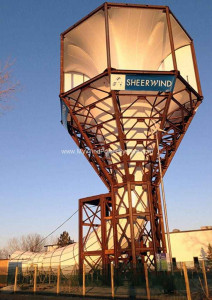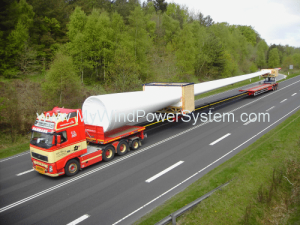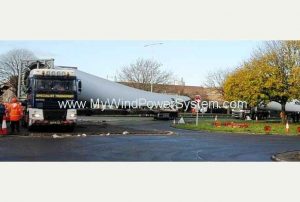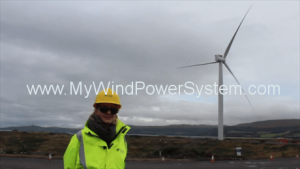Dr. Daryoush Alleai is an engineer and pioneer and founder of a company called Sheerwind, which has developed an innovative wind turbine called Invelox that has no blades. Here is a glimpse of his thought processes that led to the creation of the bladeless turbine:
“What if you could scoop the air? Scoop it and move it downward, amplifying its kinetic energy along the way, concentrating it to a single point of intensity, the way a magnifying glass concentrates sunlight to a single incendiary point. And assuming you could do this technically, could you do it on a large enough scale to make it economically feasible? More to the point, could you generate energy so inexpensively that it stages a renaissance?”
The Sheerwind Invelox turbines funnel wind into ground-level generators through a tapering passageway that squeezes and accelerates the air. The units are about half as tall as the more traditional wind towers (up to 260 feet high) while the ground-based turbine blades are more than 80 percent smaller than conventional wind turbine blades (usually about 115 feet long). In fact, it has been said that the turbine resembles a giant gramophone that sucks in wind instead of funneling out the sound!
Even though it may seem that the wind power industry has been around for decades (and it has) is still in the relatively early stages of capitalizing on the enormous potential of wind as an energy resource. Companies like Allaei’s Minnesota-based Sheerwind face considerable challenges in breaking away from the traditional mega-propeller on a stuck turbine.
But it’s not all about wind turbine design. As wind energy gains more of a foothold, operators of the electric grid will have to deal with more and more energy that does not come at the push of a button. So the wind industry will also need to improve on storage capacity and reliability that are currently provided by fossil fuels like natural gas. This is arguably the biggest challenge in the next decade, to store wind power efficiently and on a commercial scale. However, a smaller non-conventional turbine would have other advantages. Traditional wind turbines are getting bigger and bigger, and that ups the cost of transportation erection, and maintenance… particularly in inaccessible areas such as mountains or out to sea.
We look forward to the latter half of this decade coming up with some truly revolutionary wind power-related inventions and innovations!





